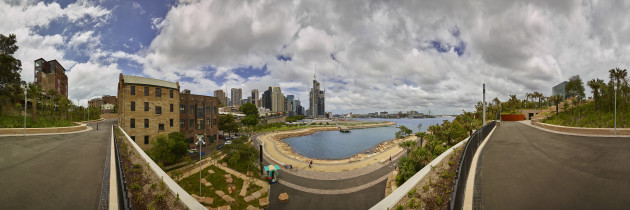Treated like a criminal?
Cnut ('King Canute') set his throne by the sea shore and commanded the incoming tide to halt and not wet his feet and robes. Yet "continuing to rise as usual [the tide] dashed over his feet and legs without respect to his royal person. Then the king leapt backwards, saying: 'Let all men know how empty and worthless is the power of kings'..." - Henry of Huntingdon, circa 1129.

Photographers and the right to shoot
Internationally renowned landscape photographer, Ken Duncan made the news recently when he was accosted by ‘customer service’ staff for taking photos at the Barangaroo Reserve, in Sydney. As was widely reported, on the day of the altercation, Duncan had gone to Barangaroo to take some photos – at no charge - for friends at a sandstone quarry who had supplied material for the park. Barangaroo Delivery Authority (BDA) ‘customer service’ staff saw Duncan looking too ‘commercial’, as he had a tripod, and went to question him. Your correspondent, accompanied by Jezebel (Chihuahua) and equipped with a Fujifilm XE-1, went there to investigate, so you don’t have to…
Dogs are permitted on leash, but we kept an eye out for security (in case, perchance, I needed a hand setting up a tripod). However, the only representative of the State to be (partially) visible was hidden in the bushes using a smartphone. The 24/7 surveillance cameras were probably tracking me, a group of cyclists who seemed to be on a commercial tour (shock), a party of pensioners, and several groups of people who seemed to be on a ‘treasure hunt’.
With the aid of the interwebs, your humble newshound looked into just who actually is 'in charge' of Barangaroo. It seems to be the Barangaroo Delivery Authority (BDA), as stated in a Huffington Post article about Ken Duncan’s situation last week. The authority quoted to Duncan by ‘customer service’ staff about not taking photos for commercial use seems to be sourced from the Barangaroo Delivery Authority Regulation 2015 (NSW), pursuant to the Barangaroo Delivery Authority Act 2009.
Essentially, the BDA sums the approach to ‘commercial photography’ up thus: ‘Prior approval must be sought for personal training, all community and commercial activities, wedding ceremonies, receptions or commercial photography.’
One puzzles over the intended extent of ‘commercial activities’. Could JK Rowling write a chapter of her new novel while sitting on the grass at Barangaroo? Could I write a poem, or a hit pop song, that I later publish for sale?
One of the things that really annoys Duncan about the whole situation is that he was singled out by ‘customer service’/security essentially for having a tripod. He thinks it is needlessly intrusive to have authorities questioning people who are doing innocent things. “Why are we comfortable with ‘security’ going and questioning people in a public place?” he asks.
Duncan argues that it is dodging the issue to just cough up and pay the fee for ‘commercial photography’. He says that there are too many authorities in charge of too many locations such as national parks, public parks, buildings and landmarks. Not only is it a bureaucratic tangle working out who can give permission to shoot where, but, also, according to Duncan, it is harming business development. “Look, if we agree we’re prepared to pay, the authorities say ‘fantastic’, but the legacy is that photographers coming in to the profession won’t be able to pay.”
Duncan does not want NSW to be a state where it’s just too hard to shoot. “This fight for the right to take photos is for the next generation of photographers,” says Duncan. “The shots I got when I was starting out, I could not get now.”
Some ‘commercial’ shoots, Duncan says, have simply not gone ahead in Australia because of all the bureaucracy. “Why don’t we make it easier to take photos - so we can employ people?” he says.
Duncan is concerned that the public space environment for all photographers is what is at risk. “This is the real issue,” he says. “If we don’t act now, things will get worse. Photographers already get bailed up, just taking personal photos. We should not get treated like criminals.”
The BDA website says, “A key part of [the Barangaroo Delivery Authority] charter is to promote and encourage public use of the precinct.” Duncan agrees with that philosophy. He’s not suggesting that photographers be allowed to block access or restrict other people from enjoying parks. “As long as a photographer doesn’t want more rights or access than anyone else,” he says, “why shouldn’t we take photos without special permits?”
Your humble newshound did not get any potentially award-winning photographs on the day of his visit. So rest easy, authorities, no commercial activity was engaged in. Jezebel did enjoy the walk, and, perhaps, one day I’ll publish a poem about it…
Head over to Ken Duncan's Facebook page for some rather robust discussion on the topic.

